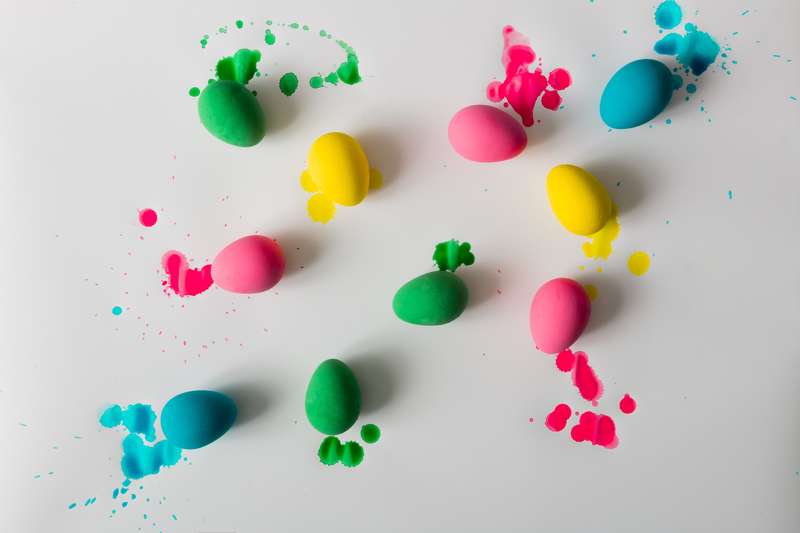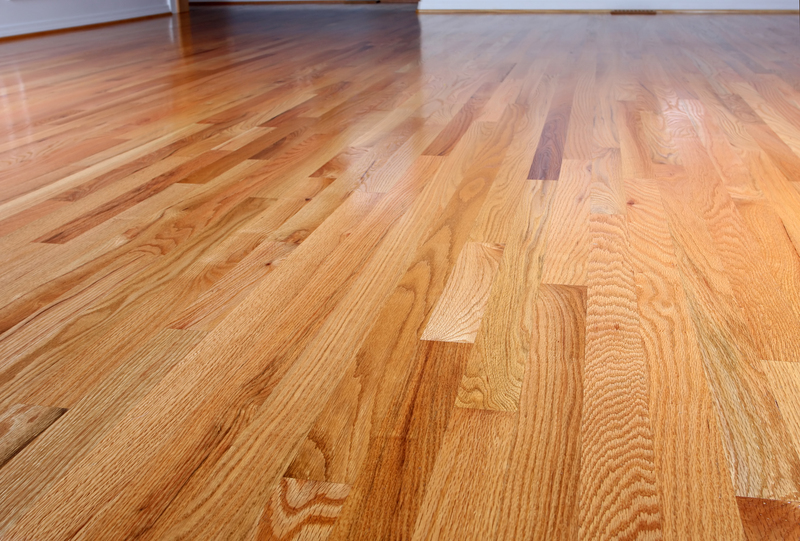Ulimate Guide to Erasing Persistent Pet Smells
Posted on 28/09/2025
Ultimate Guide to Erasing Persistent Pet Smells
Pet lovers know that owning a furry friend brings immense joy and companionship. However, it can also mean dealing with unpleasant pet odors that seem impossible to eliminate. Whether you have a playful puppy, an adventurous cat, or any other animal companion, persistent pet smells can sometimes take over your home, reducing freshness and comfort. In this comprehensive guide, we'll explore proven methods, products, and tips for erasing pet odors so you can enjoy a clean, welcoming living space.
Understanding the Source of Persistent Pet Smells
Before addressing the problem, it's crucial to identify the sources of pet odors. Common causes include:
- Urine and fecal accidents (on carpets, floors, furniture)
- Pet dander and hair accumulation
- Poorly cleaned litter boxes or cages
- Body oils and saliva on fabrics
- Unwashed bedding and toys
Recognizing the *origin* of the unwanted pet smells is your first step toward successfully eliminating the odor for good.

Why Are Pet Smells So Difficult to Remove?
Odors that come from animals are particularly tough to address due to:
- The high protein content in urine
- Bacteria growth in moist environments
- Microscopic pet hair and dander embedding deeply in fabrics
- Chemical reactions between pet waste and cleaning products that sometimes set in the odors further
It's not enough to simply mask pet smells; the key is to neutralize and remove the source completely.
Step-by-Step: The Ultimate Guide to Erasing Stubborn Pet Odors
1. Immediate Action: Remove Fresh Mishaps
If your pet has had a recent accident, swift cleanup is critical to stop odors before they set. Here's what to do:
- Blot liquids with paper towels--never rub--to remove as much moisture as possible.
- For solids, carefully pick up and dispose of the waste, then move on to cleaning up any residue.
- Sprinkle baking soda generously over the area to absorb lingering moisture and odor.
Baking soda is not only natural and safe, but it also neutralizes acidic pet urine odors on most surfaces.
2. Deep Cleaning with the Right Products
Surface cleaning alone won't be enough for persistent pet odors. Consider these options:
- Enzymatic Cleaners: Specifically designed to break down pet urine crystals and other organic matter. Enzyme cleaners are one of the best odor removers for pets.
- Hydrogen Peroxide Mixture: Combine 1 cup hydrogen peroxide, 1 teaspoon dish soap, and 1 tablespoon baking soda. Apply, let sit, then blot away.
- White Vinegar Solution: Mix equal parts white vinegar and water. This is especially effective on hard floors and washable fabrics, cutting through pet urine residue and neutralizing the smell.
3. Targeting Carpet and Upholstery
Carpet fibers and upholstered furniture are notorious for retaining dog and cat odors. For thorough cleaning:
- Vacuum the area first, using a vacuum with a HEPA filter if possible.
- Treat the spots with enzyme cleaner or a vinegar solution, allowing them to sit for several hours.
- Use a carpet cleaner designed for pet stains, or rent a steam cleaner for deep penetration.
- Let air dry, then sprinkle more baking soda overnight before vacuuming again.
Repeat the process for stubborn pet smells that won't go away after one treatment.
4. Laundering Pet Bedding, Blankets and Toys
Another common culprit of lingering pet odors is unwashed pet bedding and toys. To keep them fresh:
- Wash fabric items weekly with hot water and a cup of baking soda in addition to your normal pet-safe detergent
- Add a half cup of white vinegar to the rinse cycle
- Dry thoroughly in sunlight for additional odor control
- For non-washable items, try sprinkling baking soda, letting it sit, and vacuuming away
Regular laundering prevents the buildup of bad smells and keeps your home environment healthy.
5. Regular Maintenance: Keeping Smells from Returning
Consistency is the secret to maintaining a fresh-smelling home. Some ongoing routines include:
- Vacuum carpets, rugs, and furniture at least twice a week
- Wipe down hard surfaces with a vinegar-water solution
- Change cat litter and clean litter boxes daily
- Groom pets regularly to reduce dander and shedding
- Inspect and clean hidden pet corners (behind furniture or inside crates)
Establishing these habits ensures pet odors don't have a chance to set in, making erasing pet smells a simpler task in the long run.
Natural Solutions for Erasing Persistent Pet Odors
If you prefer eco-friendly and non-toxic remedies for pet stain and odor removal, there are several household options:
- Baking Soda: A natural deodorizer that can be sprinkled on carpets, couches, and beds. Leave for several hours, then vacuum thoroughly.
- Activated Charcoal: Place bowls or sachets in smelly areas to absorb odors from the air and surfaces.
- White Vinegar: Neutralizes pet urine, removes stains, and leaves behind a fresh scent when the vinegar dries.
- Lemon Juice: Cuts through oily residue and can help kill bacteria and fungi, reducing sources of foul smells.
- Vodka: A surprising odor-neutralizer. Lightly spritz fabrics, let dry, and enjoy odor-free results.
Natural solutions are budget-friendly, safe for most pets, and help protect household members from harsh chemicals.
Commercial Products: What Actually Works?
The market is full of products claiming to eliminate pet smells. The most effective are often labeled "enzyme-based" or "bio-enzymatic." Top trusted brands include:
- Nature's Miracle
- Rocco & Roxie Professional Strength Stain & Odor Eliminator
- Simple Solution Pet Stain & Odor Remover
- Angry Orange Odor Eliminator
Always read instructions before using, and perform a spot test first, especially on delicate fabrics.
What to Avoid
- Never use ammonia-based cleaners on pet urine-affected areas. Ammonia's scent is similar to urine and can actually encourage repeat accidents.
- Avoid mixing cleaning chemicals together, as this can produce dangerous gases or ineffective results.
- Avoid heavy perfumes to just mask odors--they do not remove the cause and can exacerbate sensitivities.
Air Quality and Ventilation
Even after cleaning surfaces, pet odors can linger in the air. Here are ways to freshen indoor air quality:
- Open windows and doors daily to increase ventilation and let out odors.
- Use air purifiers with HEPA or carbon filters targeted at pet dander and smells.
- Boil citrus peels or spices like cinnamon and cloves to naturally deodorize the air.
- Set up a regular air filter replacement schedule for your HVAC system to prevent recirculating smelly particles.
Mistakes to Avoid When Trying to Erase Pet Smells
Failure to properly address pet odors can make them worse. Avoid these common errors:
- Delaying cleanup: The sooner you tackle an accident, the less likely odors are to linger.
- Ignoring unseen areas: Accidents behind furniture or under rugs can easily be missed.
- Only using air fresheners: Masking the scent never gets rid of deep-rooted smells.
- Underestimating dander and saliva: Even "invisible" pet messes contribute to household odor.
Professional Help: When to Call the Experts
If you've tried everything and persistent pet odors remain, it may be time for professional cleaning services. Carpet and upholstery cleaners use industrial-grade machines and solutions to remove embeds smells. Other specialist services:
- Tile, grout, and hardwood floor restoration
- HVAC and duct cleaning to eliminate odors at the source
- Odor remediation professionals for severe, recurring issues
Professional help can restore your home to a truly fresh state, especially after long-term neglect or repeated accidents.
How to Prevent Persistent Pet Smells
Prevention is often easier than elimination. To keep your home smelling clean:
- Train pets regularly and provide frequent, convenient bathroom breaks
- Use washable, odor-resistant bedding and rotate them often
- Maintain high standards of hygiene for cages, crates, and litter trays
- Brush and bathe pets routinely to reduce dander and body oil deposits

FAQ: Ultimate Guide to Erasing Persistent Pet Smells
How often should I deep-clean to keep pet odors away?
Deep-clean main living areas and pet bedding at least monthly, and spot clean as needed. High-traffic zones may need weekly attention.
Are there specific breeds or animals more prone to creating bad smells?
Yes. Larger, hairier breeds, animals with health issues, or older pets may generate more odor due to oil secretion, incontinence, or digestive problems.
What if my house still smells after all these steps?
Repeated, long-term accidents can saturate padding beneath carpets or subfloors, warranting professional intervention or replacement of the affected material.
Is it safe to use essential oils to get rid of pet smells?
Many essential oils are toxic to dogs and cats. Avoid direct use around pets and choose only vet-approved products.
Conclusion: Fresh, Odor-Free Living with Pets Is Possible
Erasing persistent pet smells can be challenging but absolutely achievable with a strategic approach. By identifying odor sources, using enzymatic cleaners, maintaining regular hygiene, and ventilating your home, you'll create a healthy and welcoming environment for you and your pets. For chronic issues, don't hesitate to seek expert advice or professional help. With these tips, you can enjoy all the love your pets provide--without the lingering smells!
Take action today and start living odor-free--your nose, your guests, and your pets will thank you!
Latest Posts
Clever Strategies to Outsmart Cleaning Chores
Ulimate Guide to Erasing Persistent Pet Smells
10 Effective Carpet Hacks to Rid Your Floors of Pesky Dog Hair



